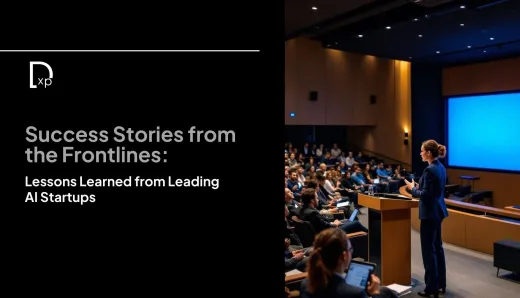Navigating the Startup Ecosystem: How to Identify Promising AI Ventures

Let’s be honest—the AI space is exploding right now. Every other pitch deck says “revolutionary” and every founder claims to be “transforming the world with machine learning.” And yet, some of these ventures are actually doing it. They're building the future, changing industries, and yes—disrupting the way we live, work, and create.
The challenge? Knowing which ones are the real deal.
If you’re an investor, advisor, or founder looking to collaborate, knowing how to spot promising AI ventures early on can give you a front-row seat to what’s next… before it hits the mainstream. Let’s walk through what really matters—and what doesn’t—when it comes to identifying standout AI startups in today’s fast-moving ecosystem.
It Starts With the Problem, Not the Tech
Here’s something I’ve learned from talking to dozens of founders and operators: the strongest AI startups aren’t obsessed with AI. They’re obsessed with the problem they’re solving.
If a startup leads with the tech, be cautious. But if they’re deeply immersed in a pain point—one that real people or companies are struggling with right now? That’s your first green flag.
Promising AI ventures focus on relevance before elegance. They build tech in service of a solution, not just for the sake of using something trendy. So when you’re evaluating a new startup, don’t ask “what’s your model?”—ask “why does this matter, and who needs it?”
Founders Who Live Close to the Problem
The most compelling AI startups usually have founders with proximity to the pain. Maybe they worked in the industry they’re trying to fix. Maybe they experienced the problem firsthand. Maybe they’ve been building quietly in the space for years before raising a cent.
That kind of founder-market fit is gold.
It creates empathy, urgency, and focus. These are the founders who build with nuance, not just assumptions. And they’re the ones more likely to survive the inevitable pivots that come with launching something new.
So if you're choosing where to put your time, energy, or capital, pay close attention to who’s behind the product—and why they started building in the first place.
Strong Signals (That Aren’t Just Hype)
In a noisy market, it’s easy to get distracted by flashy branding or big-name investors. But when you're trying to find promising AI ventures, look for deeper signals.
Are they growing sustainably? Do they have real customer feedback or early traction? Are users coming back, or just testing and leaving?
It doesn’t have to be perfect. (Spoiler: it never is.) But you want to see momentum. You want to see evidence that something real is happening—and that the team is learning fast.
If they’re actively experimenting, iterating on feedback, and staying close to their users, that’s a very good sign. Because in the early stages, how a team learns is often more important than what they’ve built.
Tech That’s Useful, Not Just Impressive
Some AI can write Shakespearean sonnets or beat you at chess. Cool, but… does it solve anything?
The best AI startups in 2025 are using AI to do things that are boring on the surface but brilliant in impact. Think optimizing logistics, predicting sales patterns, automating compliance.
These tools may not be sexy at first glance, but they’re solving expensive, frustrating problems. And that is where value lives.
Look for startups where the AI is invisible to the end user—where it just works, and makes life 10x better. That’s when you know the tech is doing its job. It’s not center stage. It’s the engine quietly powering real transformation.
The People Behind the Pitch
At the end of the day, startups are human. The team matters. A lot.
When you’re evaluating promising AI ventures, ask yourself:
Do these people have grit?
Are they coachable?
Are they obsessed with getting better?
The ability to raise money doesn’t always mean the ability to build something meaningful. So lean into your gut here. Look for founders with clarity, humility, and relentless curiosity. The ones who light up when they talk about the problem, not just the opportunity.
Because talent will build a product. But heart? That’s what builds a legacy.
Don’t Just Watch Trends—Watch Users
Yes, there are patterns. Yes, AI is hot right now. But real signals of success come from users, not trend graphs.
AI startups that are gaining organic traction, building communities, or getting love from unexpected corners of the internet? Pay attention. Because when people talk about a product without being paid to? That’s real.
Follow the conversation. Read the reviews. Lurk in the forums. Some of the most exciting promising AI ventures in 2025 are growing quietly, with deep loyalty from early adopters—and that’s worth more than any PR hit.
You Don’t Need to Bet Big to Bet Smart
Here’s something that aligns with everything I believe in: You don’t have to make massive bets to start engaging with the space. Follow early-stage founders on social. Join demo days. Mentor a team. Ask thoughtful questions.
You’ll be amazed how much insight and inspiration you gain just by staying close to the builders. That proximity gives you a sense of what’s possible—and what’s actually working—in a way no market report ever could.
And maybe? You’ll find a venture you want to support, back, or build with.
Final Thoughts: Choose Curiosity Over Certainty
We’re in a moment where innovation is moving faster than most of us can track. And yet, the most grounded, successful people I know aren’t the ones trying to predict the future. They’re the ones staying curious, asking better questions, and learning from the builders already shaping it.
Promising AI ventures are out there. Not just building hype—but building value. If you know where to look, what to ask, and how to listen… you’ll find them.
And maybe? You’ll even build one of your own.




